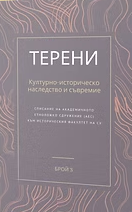Прислугата в Следосвобожденска България
DOI :
https://doi.org/10.60053/TER.2018.3.148-161Резюме
This article traces the history of servants in Bulgaria after the liberation of Ottoman Empire (1878). Unlike the West Europe, in the Balkans servant society was not developed within the social boundaries. In the beginning of 19 century there were small features which showed indication of a system, similar to the servant class in the West. The interpreters can see them into the slave roots or in the more civil system of hiring someone to help for the house work. Due to the new government and cultural appropriation from the West, Bulgarian society started to integrate some of the features common to countries like Germany, France and England. One of them was the creation of the servant system, which was accepted as common only for the rich parts of the society. Through newspapers and researches this article attempts to show this particular part of the society which in the end developed its canons, rights, rules and institutions. Despite that with the coming of the Communist regime in 1944 this servant public system was destroyed.
Библиография:
Гунчев 1933: Гунчев, Г. Вакарел - антропогеографски проучвания. София, 1933
Георгиев 1983: Георгиев, Г. София и софианци 1878-1944. София, 1983
Илиева 1989: Илиева, В. Някои форми на гурбетчийство в Габровско от Освобождението до средата на ХХ век. В: Етнографски сборник „Етър“,Габрово, 1989, т. І, с. 95-112.
Костенцева- Мецгер 2008: Костенцева- Мецгер, Райна Михайлова. Моят роден град София в края на XIX и началото на XX век и след това. София, 2008.
Костенцева 1979: Костенцева, Райна. Моят роден град. София, 1979
Христов 2010: Христов, П. Трудова миграция и промяна в традиционния костюм (по материали от Средна Западна България). В: Многообразие в единството, 1, София:Съюз на учените в България, 2010, ISSN 1314-0825, с. 162-173
Schwarz 1999: Schwarz, Leonard. English Servants and Their Employers during the Eighteenth and Nineteenth Centuries.// The Economic History Review, New Series, Vol. 52, No. 2 (May, 1999), pp. 236-256
Hristov: Hristov, Petko. "Trans-border Exchange of Seasonal Workers in the Central Regions of theBalkans (19th – 20th Century)". Ethnologia Balkanica 12:215- 230.
Печатни периодични броеве:
Сп. Кръгосвет. София, 1929, бр. 5, с.15
в. Вестник на жената. София, 1926-1927; 1928-1929; 1929-1930;
в. Пряпорец.София, 1930, март
в. Щурец. София, 1941, бр. 441, с. 2
Гергьовден.В.Щурец. София, 1935, бр.125, с.1
Димитровденска хроника.В. Щурец. София, 1935, бр. 152, с. 1
Димитровденски. В.“ Щурец“. София.1935, бр. 152, с. 1
Как прекарахме Димитровденъ. В. Щурец. София, 1934, бр. 100, с. 6
На слугинския пазар.В. Щурец.София, 1993, брой 20, с. 1
Политическа борба. В.Щурец. София, 1939,бр. 361,с. 1
Седмичен дневник. Разговор с една слугиня.В.Щурец. София, 1993, бр. 47, с. 3
Слугински пазар.В.Щурец. София, 1941, бр. 459, с. 1
Слугинският въпрос. В. Щурец. София, 1938, бр. 284, с. 3
Онлайн източници:
Недева, Тодорка. „Старо Търново. Конкурс за най-красива слугиня “Мис Чешма”. Търново, 2013, http://www.borbabg.com/?action=news&news=28535
Стоилов, Ваньо. Баба Мария била слугиня на генерала, който не дал дъщеря си на Ататюрк. София, 2015, https://www.24chasa.bg/novini/article/5035960
Ценкова, Искра. Плът за продан. Сп. Тема. София, http://www.temanews.com/index.php?p=tema&iid=230&aid=5670






